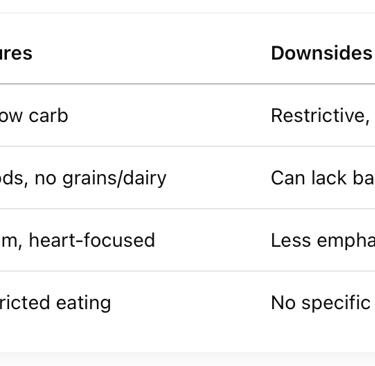



About Our Journey
Explore the benefits of the Mediterranean diet and learn how to incorporate its delicious, nutritious foods into your daily life for optimal health.
Mediterranean Diet Benefits
A Delicious Path to Long-Term Health
Why the Mediterranean Diet Stands the Test of Time
The Mediterranean diet isn’t just another food trend—it’s a time-tested, culturally rich eating pattern deeply rooted in the traditional cuisines of countries bordering the Mediterranean Sea. Recognized for its powerful effects on heart health, longevity, and even mental well-being, this diet continues to dominate nutritional headlines—and for good reason.
Unlike restrictive diets that eliminate food groups or promote unsustainable calorie cuts, the Mediterranean diet celebrates variety, flavor, and balance. Its hallmark foods—fresh vegetables, fruits, olive oil, whole grains, nuts, seeds, legumes, fish, and moderate wine—have been enjoyed for generations in regions like Greece, Italy, and southern France.
What makes the Mediterranean diet particularly compelling is the strong scientific consensus supporting it. From reducing the risk of heart disease and stroke to aiding in weight management and lowering inflammation, its health benefits are consistently validated by research.
More than just a diet, it’s a lifestyle—emphasizing social meals, physical activity, and mindful eating. In a world increasingly obsessed with short-term results and rigid protocols, the Mediterranean way offers a sustainable, joyful approach to long-term health.
In this comprehensive guide, we’ll explore the key Mediterranean diet benefits, examine what makes it effective, and offer practical tips to help you bring its wisdom into your daily routine.
What Is the Mediterranean Diet?
The Mediterranean diet is more than a meal plan—it’s a cultural and nutritional philosophy inspired by the eating habits of people in Greece, Italy, and other Mediterranean regions during the mid-20th century.
It’s characterized by:
High intake of plant-based foods
Olive oil as the primary fat source
Moderate consumption of fish and poultry
Low intake of red meat and processed foods
Optional moderate wine consumption
Meals often enjoyed communally and without rush
Unlike fad diets, it doesn’t come with strict rules or calorie counting. Instead, it focuses on whole, minimally processed foods, flavor, and long-term sustainability.
Core Mediterranean Diet Foods
Fruits and Vegetables:
Rich in vitamins, fiber, and antioxidants—fresh produce forms the base of nearly every meal.
Whole Grains:
Bread, pasta, barley, couscous, and farro are preferred in their whole forms.
Healthy Fats:
Extra virgin olive oil is the star here—rich in monounsaturated fats and polyphenols.
Legumes and Nuts:
Chickpeas, lentils, almonds, and walnuts supply plant-based protein and fiber.
Fish and Seafood:
Omega-3-rich options like sardines, mackerel, and salmon are favored over red meat.
Dairy (in moderation):
Mostly fermented forms like yogurt and cheese, consumed in small amounts.
Herbs and Spices:
Flavor enhancers like oregano, rosemary, garlic, and cinnamon reduce the need for salt.
Wine (optional):
Red wine is often consumed moderately, usually with meals.
Mediterranean Diet Benefits: What the Research Says
Heart Health and Reduced Cardiovascular Risk
One of the most well-documented Mediterranean diet benefits is its protective effect on the heart. A landmark study, the PREDIMED trial, showed that people who followed the Mediterranean diet had a 30% lower risk of major cardiovascular events compared to a low-fat diet group.
Its combination of healthy fats, antioxidants, and fiber helps:
Lower LDL (bad) cholesterol
Increase HDL (good) cholesterol
Reduce blood pressure and arterial inflammation
Weight Loss and Weight Management
Though it wasn’t designed for weight loss, many people shed pounds effortlessly on the Mediterranean diet. The focus on satiating, fiber-rich foods and healthy fats helps regulate appetite and reduce cravings.
It’s easier to stick with long-term because:
No food group is strictly off-limits
You eat satisfying meals
It doesn’t feel like “dieting"
Improved Brain Health and Cognitive Function
Studies link the Mediterranean diet to a lower risk of cognitive decline, Alzheimer’s disease, and dementia. The anti-inflammatory and antioxidant properties of olive oil, leafy greens, and fish support brain structure and function.
The MIND diet (a hybrid of Mediterranean and DASH diets) was specifically created to slow brain aging and has shown promising results.
Lower Risk of Type 2 Diabetes
The Mediterranean diet improves insulin sensitivity and glycemic control, making it beneficial for preventing or managing type 2 diabetes. Whole grains, legumes, and healthy fats reduce blood sugar spikes and promote steady energy.
Reduced Inflammation
Chronic inflammation is linked to diseases from arthritis to cancer. The Mediterranean diet’s rich polyphenol content (from olive oil, fruits, and red wine) helps modulate the body’s inflammatory response.
Markers like CRP (C-reactive protein) often decrease on this diet, indicating reduced inflammation.
Improved Gut Health
A Mediterranean-style eating pattern supports a diverse gut microbiome. Fermented dairy, fiber-rich produce, and legumes feed beneficial gut bacteria—boosting immunity and reducing digestive issues.
Cancer Prevention
Some research suggests that the Mediterranean diet may help lower the risk of certain cancers, particularly breast and colorectal cancer. Antioxidants, fiber, and omega-3s play a role in cellular repair and reduced oxidative stress.


Mediterranean Diet vs. Other Diets


The Mediterranean diet stands out for its balance, flexibility, and pleasure in eating—making it one of the most sustainable options for lifelong health.
How to Start the Mediterranean Diet: Simple Shifts for Big Results
Adopting the Mediterranean lifestyle doesn’t require an overhaul of your kitchen overnight. Start with small, enjoyable changes—and let your taste buds lead the way. Here’s how to ease into it like a true Mediterranean local:
Drizzle, Don’t Butter
Trade out butter and refined oils for extra virgin olive oil, the golden star of this diet. Use it to sauté veggies, dress salads, or drizzle over roasted potatoes for a heart-healthy flavor boost.
Paint Your Plate with Produce
Make vegetables the main event—not just a sidekick. Aim to fill half your plate with vibrant, seasonal veggies like spinach, tomatoes, zucchini, and bell peppers. Roast them, grill them, or enjoy them raw with a splash of olive oil and lemon.
Reel In More Seafood
Fish is the Mediterranean protein of choice. Enjoy salmon, sardines, or mackerel twice a week. Try it grilled with herbs, baked with tomatoes, or tossed into a warm grain bowl for an omega-3-rich meal.
Snack Like the Greeks
Step away from the vending machine. Reach for almonds, pistachios, olives, or fresh fruit when hunger strikes. These natural snacks keep you full longer and support steady energy.
Go With the Grain (Whole Grain, That Is)
Skip the white bread and opt for farro, bulgur, brown rice, or whole wheat pasta. These grains are nutty, filling, and fiber-packed—perfect for salads, bowls, and stews.
Make Mealtime an Experience
In the Mediterranean, food isn’t rushed—it’s savored and shared. Slow down, chew mindfully, and enjoy your meals at the table (preferably with good company and good conversation).
Mediterranean Diet: More Than Just Food
The Mediterranean diet isn’t just a set of eating guidelines—it’s a way of life. Its long-term success and health benefits come not only from what’s on the plate, but also from the habits, values, and cultural rhythms surrounding food.
Here’s what truly sets it apart:
Community
Meals in Mediterranean cultures are rarely rushed or eaten alone. They’re social experiences, often shared with family, neighbors, or friends around a table filled with simple, homemade dishes. This communal aspect strengthens bonds and enhances emotional well-being—something often missing in Western fast-paced lifestyles.
Movement
Exercise isn’t always structured in these regions—it’s embedded in daily life. People walk to the market, tend gardens, climb hills, or dance at festivals. This natural, low-intensity activity promotes cardiovascular health and joint mobility without ever stepping foot in a gym.
Simplicity
Forget long ingredient lists and complicated prep. The Mediterranean lifestyle favors fresh, seasonal ingredients cooked simply to let the natural flavors shine. Meals might be a tomato-and-olive salad, grilled fish with lemon, or a slice of crusty bread with cheese and fruit—unfussy but deeply nourishing.
Joy
Above all, food is a source of pleasure, not stress. There’s no guilt around a piece of baklava or a glass of wine. Meals are savored, not scarfed down, and eaten with full presence. This mindful enjoyment helps with digestion, portion control, and long-term satisfaction.
These lifestyle principles aren’t just nice add-ons—they’re part of the reason why Ikaria in Greece and Sardinia in Italy, both Mediterranean islands, are home to some of the world’s longest-living people. Known as Blue Zones, these areas show dramatically lower rates of heart disease, dementia, and depression—proof that the Mediterranean diet works because it’s about much more than calories or carbs.
It’s a full-circle approach to health that nourishes body, mind, and spirit—and it's something we can all learn from, no matter where we live.
Final Thoughts: Why the Mediterranean Diet Works
The Mediterranean diet benefits stretch far beyond basic nutrition or weight loss. It’s a deeply rooted, science-backed approach to eating that supports heart health, brain longevity, metabolic balance, and reduced inflammation—all while celebrating the pleasure of food.
Unlike restrictive trends that demonize entire food groups or rely on intense tracking, the Mediterranean way is flexible, intuitive, and satisfying. It encourages a natural rhythm of eating that’s in tune with your body, your environment, and your culture. You’re not counting calories—you’re focusing on quality, variety, and connection.
Research doesn’t just suggest that this diet works—it confirms it across decades and continents. From lowering the risk of heart disease and type 2 diabetes to promoting better aging and even happier moods, the evidence is overwhelming: this way of eating is not only effective, but sustainable for life.
But perhaps what makes it most powerful is its wholeness. The Mediterranean diet isn’t just about what you eat. It’s about how you eat, who you eat with, and how you live. It invites you to slow down, savor meals, move more naturally, and connect—both to your food and the people around you.
In a world full of extremes, the Mediterranean diet offers a return to balance, flavor, and joy. Whether your goal is to lower disease risk, support mental clarity, or simply live a healthier, more fulfilling life, this lifestyle offers a path that is as delicious as it is nourishing.
Gallery












Explore the vibrant flavors and health benefits of Mediterranean cuisine.

The Mediterranean diet transformed my meals, making them delicious and heart-healthy. Highly recommend it!
Sarah J.

I've lost weight and feel more energetic since adopting the Mediterranean diet. It's truly life-changing!
Mark T.

